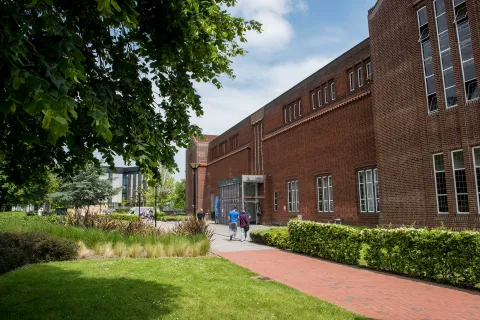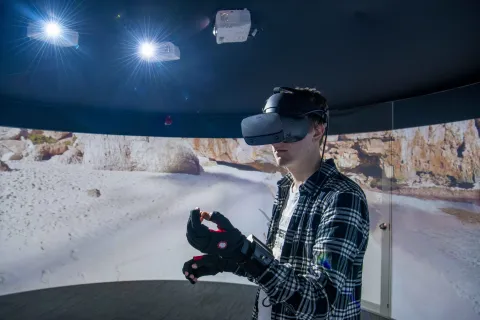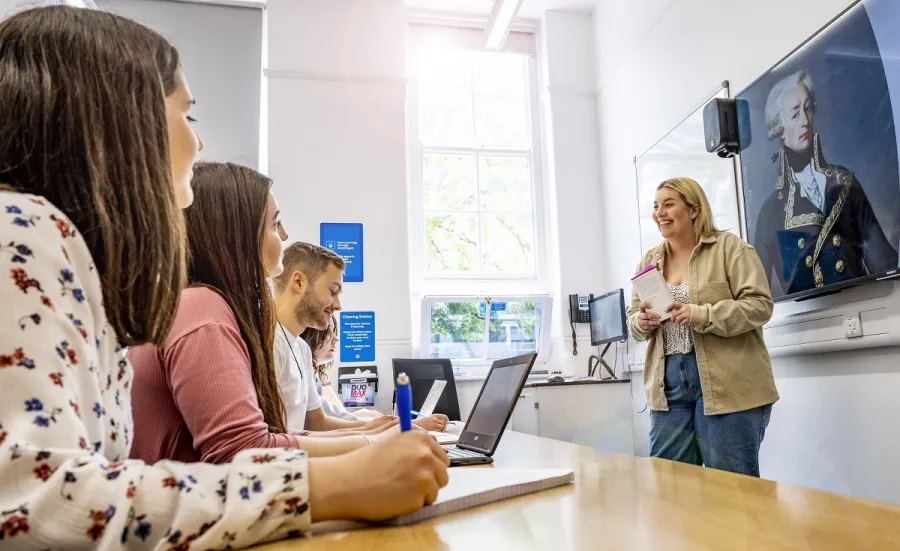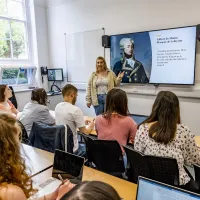Facilities

Main library


Improve your knowledge of history and literature in English by studying them together. You could read fiction from Africa to help you understand European political history. You could gain new insights into the reign of James I by immersing yourself in the theatre of his time. A year abroad will enhance your studies and let you experience a new culture.
History at Southampton covers the ancient world to the present day. Our English modules explore writing from around the world and its connection to politics, the arts, identity and more.
With our advice, you can shape your degree to suit your own development. For example, you can:
Your studies will include critical analysis, presentations and group work. These will help you develop your conceptual thinking, communication and research skills.
You can take modules that support your year abroad, such as a modern language or European politics.
Our year abroad partner universities in Europe include:
You can also choose universities outside Europe, including locations in:
As part of this course you can:
You can deepen your links to our History community by:
We regularly review our courses to ensure and improve quality. This course may be revised as a result of this. Any revision will be balanced against the requirement that the student should receive the educational service expected. Find out why, when, and how we might make changes.
Our courses are regulated in England by the Office for Students (OfS).

We delve into socio-economic matters and learn about theories that apply to contemporary society. Learning a new text every week also gives more freedom with what to write assignments around and gives me a well-rounded view of literature.


This course is based at Avenue.
This qualification is awarded by the University of Southampton.
AAB including an essay writing subject
Essay writing subjects include: History, English Language and Literature, English Language, English Literature, Drama and Theatre Studies, Modern Languages, Philosophy, Religious Studies, Classical Civilisation, Politics, Geography, Sociology, Latin or any other humanities-based essay writing subjects.
If you are taking an EPQ in addition to 3 A levels, you will receive the following offer in addition to the standard A level offer: ABB including an essay writing subject, and grade A in the EPQ
We are committed to ensuring that all applicants with the potential to succeed, regardless of their background, are encouraged to apply to study with us. The additional information gained through contextual data allows us to recognise an applicant's potential to succeed in the context of their background and experience. Applicants who are highlighted in this way will be made an offer which is lower than the typical offer for that programme.
Pass, with 34 points overall with 17 points at Higher Level, including 5 at Higher Level in an essay writing subject
Essay writing subjects include: History, English Language and Literature, English Language, English Literature, Drama and Theatre Studies, Modern Languages, Philosophy, Religious Studies, Classical Civilisation, Politics, Geography, Sociology, Latin or any other humanities-based essay writing subjects.
We are committed to ensuring that all learners with the potential to succeed, regardless of their background, are encouraged to apply to study with us. The additional information gained through contextual data allows us to recognise a learner’s potential to succeed in the context of their background and experience. Applicants who are highlighted in this way will be made an offer which is lower than the typical offer for that programme.
Offers will be made on the individual Diploma Course subject(s) and the career-related study qualification. The CP core will not form part of the offer. Where there is a subject pre-requisite(s), applicants will be required to study the subject(s) at Higher Level in the Diploma course subject and/or take a specified unit in the career-related study qualification. Applicants may also be asked to achieve a specific grade in those elements. Please see the University of Southampton International Baccalaureate Career-Related Programme (IBCP) Statement for further information. Applicants are advised to contact their Faculty Admissions Office for more information.
Distinction, Distinction in the BTEC National Extended Diploma plus A in an A level essay writing subject or Distinction, Distinction in the BTEC National Diploma plus A in an A level essay writing subject or Distinction in the BTEC National Extended Certificate plus A in an A level essay writing subject and A in one further A level
We are committed to ensuring that all learners with the potential to succeed, regardless of their background, are encouraged to apply to study with us. The additional information gained through contextual data allows us to recognise a learner’s potential to succeed in the context of their background and experience. Applicants who are highlighted in this way will be made an offer which is lower than the typical offer for that programme.
Offers typically exclude General Studies and Critical Thinking. Essay writing subjects include: History, English Language and Literature, English Language, English Literature, Drama and Theatre Studies, Modern Languages, Philosophy, Religious Studies, Classical Civilisation, Politics, Geography, Sociology, Latin or any other humanities-based essay writing subjects.
Distinction, Distinction in the BTEC Extended Diploma plus A in an A level essay writing subject or Distinction, Distinction in the BTEC Diploma plus A in an A level essay writing subject or Distinction in the BTEC Subsidiary Diploma plus A in an A level essay writing subject and A in one further A level
We are committed to ensuring that all learners with the potential to succeed, regardless of their background, are encouraged to apply to study with us. The additional information gained through contextual data allows us to recognise a learner’s potential to succeed in the context of their background and experience. Applicants who are highlighted in this way will be made an offer which is lower than the typical offer for that programme.
60 credits with a minimum of 45 credits at Level 3, of which 39 must be at Distinction and 6 credits at Merit, to include 6 Distinctions in an essay writing subject
Offers typically exclude General Studies and Critical Thinking. Essay writing subjects include: History, English Language and Literature, English Language, English Literature, Drama and Theatre Studies, Modern Languages, Philosophy, Religious Studies, Classical Civilisation, Politics, Geography, Sociology, Latin or any other humanities-based essay writing subjects.
H1 H2 H2 H2 H2 H2 -including an essay writing subject
Offers typically exclude General Studies and Critical Thinking. Essay writing subjects include: History, English Language and Literature, English Language, English Literature, Drama and Theatre Studies, Modern Languages, Philosophy, Religious Studies, Classical Civilisation, Politics, Geography, Sociology, Latin or any other humanities-based essay writing subjects.
Offers will be based on exams being taken at the end of S6. Subjects taken and qualifications achieved in S5 will be reviewed. Careful consideration will be given to an individual’s academic achievement, taking in to account the context and circumstances of their pre-university education.
Please see the University of Southampton’s Curriculum for Excellence Scotland Statement (PDF) for further information. Applicants are advised to contact their Faculty Admissions Office for more information.
D3 D3 M2 in three principal subjects including an essay related subject.
Offers typically exclude General Studies and Critical Thinking. Essay writing subjects include: History, English Language and Literature, English Language, English Literature, Drama and Theatre Studies, Modern Languages, Philosophy, Religious Studies, Classical Civilisation, Politics, Geography, Sociology, Latin or any other humanities-based essay writing subjects.
AAB from 3 A levels including an essay writing subject, or AA from two A levels including an essay writing subject and B from the Advanced Welsh Baccalaureate Skills Challenge Certificate
Offers typically exclude General Studies and Critical Thinking. Essay writing subjects include: History, English Language and Literature, English Language, English Literature, Drama and Theatre Studies, Modern Languages, Philosophy, Religious Studies, Classical Civilisation, Politics, Geography, Sociology, Latin or any other humanities-based essay writing subjects.
We are committed to ensuring that all learners with the potential to succeed, regardless of their background, are encouraged to apply to study with us. The additional information gained through contextual data allows us to recognise a learner’s potential to succeed in the context of their background and experience. Applicants who are highlighted in this way will be made an offer which is lower than the typical offer for that programme.
Not accepted for this course.
Applicants must hold GCSE English language (or GCSE English) (minimum grade 4/C) and mathematics (minimum grade 4/C)
Find the equivalent international qualifications for our entry requirements.
If English isn't your first language, you'll need to complete an International English Language Testing System (IELTS) to demonstrate your competence in English. You'll need all of the following scores as a minimum:
We accept other English language tests. Find out which English language tests we accept.
If you don’t meet the English language requirements, you can achieve the level you need by completing a pre-sessional English programme before you start your course.
You might meet our criteria in other ways if you do not have the qualifications we need. Find out more about:
Find out more about our Admissions Policy.
ABB
If you are taking an EPQ in addition to 3 A levels, you will receive the following offer in addition to the standard A level offer: BBB and grade A in the EPQ
We are committed to ensuring that all applicants with the potential to succeed, regardless of their background, are encouraged to apply to study with us. The additional information gained through contextual data allows us to recognise an applicant's potential to succeed in the context of their background and experience. Applicants who are highlighted in this way will be made an offer which is lower than the typical offer for that programme.
Pass, with 32 points overall with 16 points at Higher Level
We are committed to ensuring that all learners with the potential to succeed, regardless of their background, are encouraged to apply to study with us. The additional information gained through contextual data allows us to recognise a learner’s potential to succeed in the context of their background and experience. Applicants who are highlighted in this way will be made an offer which is lower than the typical offer for that programme.
Offers will be made on the individual Diploma Course subject(s) and the career-related study qualification. The CP core will not form part of the offer. Where there is a subject pre-requisite(s), applicants will be required to study the subject(s) at Higher Level in the Diploma course subject and/or take a specified unit in the career-related study qualification. Applicants may also be asked to achieve a specific grade in those elements. Please see the University of Southampton International Baccalaureate Career-Related Programme (IBCP) Statement for further information. Applicants are advised to contact their Faculty Admissions Office for more information.
Distinction, Distinction in the BTEC National Extended Diploma plus B in an A level, or Distinction, Distinction in the BTEC National Diploma plus B in an A level, or Distinction in the BTEC National Extended Certificate plus AB from 2 A levels.
We are committed to ensuring that all learners with the potential to succeed, regardless of their background, are encouraged to apply to study with us. The additional information gained through contextual data allows us to recognise a learner’s potential to succeed in the context of their background and experience. Applicants who are highlighted in this way will be made an offer which is lower than the typical offer for that programme.
Offers typically exclude General Studies and Critical Thinking.
Distinction, Distinction in the BTEC Extended Diploma plus B in an A level, or Distinction, Distinction in the BTEC Diploma plus B in an A level, or Distinction in the BTEC Subsidiary Diploma plus AB from 2 A levels.
We are committed to ensuring that all learners with the potential to succeed, regardless of their background, are encouraged to apply to study with us. The additional information gained through contextual data allows us to recognise a learner’s potential to succeed in the context of their background and experience. Applicants who are highlighted in this way will be made an offer which is lower than the typical offer for that programme.
60 credits with a minimum of 45 credits at Level 3, of which 30 must be at Distinction and 15 credits at Merit.
Offers typically exclude General Studies and Critical Thinking.
H1 H2 H2 H2 H3 H3
Offers will be based on exams being taken at the end of S6. Subjects taken and qualifications achieved in S5 will be reviewed. Careful consideration will be given to an individual’s academic achievement, taking in to account the context and circumstances of their pre-university education.
Please see the University of Southampton’s Curriculum for Excellence Scotland Statement (PDF) for further information. Applicants are advised to contact their Faculty Admissions Office for more information.
D3 M2 M2 in three principal subjects
Offers typically exclude General Studies and Critical Thinking.
ABB from 3 A levels, or AB from two A levels and B from the Advanced Skills Baccalaureate Wales.
Offers typically exclude General Studies and Critical Thinking.
We are committed to ensuring that all learners with the potential to succeed, regardless of their background, are encouraged to apply to study with us. The additional information gained through contextual data allows us to recognise a learner’s potential to succeed in the context of their background and experience. Applicants who are highlighted in this way will be made an offer which is lower than the typical offer for that programme.
Not accepted for this course.
Applicants must hold GCSE English language (or GCSE English) (minimum grade 4/C) and mathematics (minimum grade 4/C)
Find the equivalent international qualifications for our entry requirements.
If English isn't your first language, you'll need to complete an International English Language Testing System (IELTS) to demonstrate your competence in English. You'll need all of the following scores as a minimum:
We accept other English language tests. Find out which English language tests we accept.
If you don’t meet the English language requirements, you can achieve the level you need by completing a pre-sessional English programme before you start your course.
You might meet our criteria in other ways if you do not have the qualifications we need. Find out more about:
Find out more about our Admissions Policy.
Please contact our enquiries team if you're not sure that you have the right experience or qualifications to get onto this course.
Email: enquiries@southampton.ac.uk
Tel: +44(0)23 8059 5000
You’ll explore literature in English, starting in the medieval era. You'll study history from the ancient world up to the present day. Both subjects include modules that focus on other countries and cultures.
You'll have a huge amount of choice about how and what you learn. For example, you could take several modules in Russian history or creative writing.
Each year you can take modules from subject areas outside of English and History. You do not need to choose your modules when you apply. We'll guide you through the process before you start.
You’ll take an equal number of module credits in English and History. You’ll gain a foundation in critical thinking, essay writing and joint research. This will help you develop your own views and approaches in the study of literature.
You’ll take a compulsory module in world histories, and must study 1 History module which covers the period before 1750.
Typical modules cover topics such as:
You'll choose all of your modules, keeping a roughly equal balance of English and History topics. We encourage you to take modules from across historical periods.
Modules include topics such as:
In the second semester, you’ll take a module to prepare you for your year abroad.
You’ll study at one of our partner universities. Your lectures will be in English but you'll have opportunities to develop your language skills.
Alternatively, you can take an approved work placement abroad instead.
You’ll write a monthly personal blog to document your learning. This will record events, activities and intercultural encounters you experience. You’ll write a year abroad report with support from an academic supervisor.
You'll take a module examining your experiences abroad. This will help you produce an enhanced CV.
You’ll write a dissertation on a research topic of your choice in either English or History.
You’ll also choose modules from a wide range of topics, including:
Want more detail? See all the modules in the course.
The modules outlined provide examples of what you can expect to learn on this degree course based on recent academic teaching. As a research-led University, we undertake a continuous review of our course to ensure quality enhancement and to manage our resources. The precise modules available to you in future years may vary depending on staff availability and research interests, new topics of study, timetabling and student demand. Find out why, when and how we might make changes.
You must study the following modules in year 1:
English has always been on the move. As a literary language, it has not only travelled from and back to England; lines of influence between texts, authors, publishers, editors, book technologies, and readers traverse the globe in multiple directions, bet...
History is not just about studying written documents and sources; historians examine the ‘stuff’ of history, including objects, images, and buildings which were made and used by people in the past. We can also ‘read’ these sources, if we know how to appro...
‘A novel does not assert anything; a novel searches and poses questions’. The contemporary novelist Milan Kundera describes the novel as an exploratory and engaging form, a way of telling stories that involves readers both in its searches and in the quest...
In this history department, we have historians working on periods from the ancient world to the contemporary moment, covering the whole world (and beyond!) and working on themes like gender, politics, environment, and technology. This module covers a rang...
You must also choose from the following modules in year 1:
The 1979 Revolution unexpectedly established a clerical regime in Iran for the first time in its history. What were the roots and consequences of this Revolution? This module surveys this history from an anti-Shah movement initiated by university students...
This module will provide you with an overview of the key events in the reign of Henry VIII including the Field of the Cloth of Gold, the dissolution of the monasteries and war with France in 1513 and 1544. You will have the opportunity to think about what...
Why have some stories gripped the imagination of writers, musicians, and artists across cultures and centuries? And what does the emergence and constant re-emergence of such stories tell us about ourselves and others, past and present? What do readers and...
The Dead Sea fortress Masada was the last stronghold of resistance to Roman rule in Judea. Following the outbreak of revolt against Rome (66) and the fall of Jerusalem to the soldiers of the Roman emperor Vespasian (70), the fortress was finally taken in...
The Crimean War (1853-56) was the most important Great Power conflict fought between the end of the Napoleonic Wars in 1815 and the outbreak of World War One in 1914. Yet its causes are uncertain and the way it was fought was often paradoxical: modern te...
Where did the idea of ‘English Literature’ as we know it today come from? When and how did writers first start thinking of themselves as English authors? How did the mechanisms of book production and the material forms of books shape readers’ understandin...
The module asks big questions. What do we do when we interpret literature and culture, and how can we analyse our practices of interpretation? Can anything be a text, and if so what do we understand by ‘literature’? How does literature shape our identity,...
In this module, you will learn how to approach dramatic texts in a way that takes into consideration their place in the world as a complex political, economic, and cultural network. We will focus on questions such as: • What is the difference between r...
You must study the following modules in year 2:
This module will prepare you for study abroad and also take you through the application process for study abroad. Before you travel, you are required to take out appropriate insurance policies and engage in on-going monitoring of risk and this module will...
History has a life which stretches far beyond the ivory tower of academia and university study. This module encourages you to reflect on how historians translate academic knowledge into public history. It introduces you to the many different audiences for...
Revolutions would break, remake, and reform societies on both sides of the Atlantic from the disruptions of the English Civil War to the global conflicts of the Napoleonic Empire. Revolutions may be those sudden changes in political life that men have tra...
This non-credit bearing module is a required element for all Humanities students on a Year Abroad Programme. It builds on the Year Abroad preparation module, HUMA2012. It is taken as a long thin single module whilst on the Year Abroad with a two hour prep...
The Year in Employment (YiE) is an opportunity for undergraduate students across a range of programmes to undertake a placement year whilst remaining enrolled to the University of Southampton. Students complete their placement after their second year of s...
You must also choose from the following modules in year 2:
In Africa, the ideal of freedom has the capacity to evoke multiple layers of struggle and aspiration: from state decolonisation and the end of official racial segregation, to gendered, national, economic and spiritual freedoms. Historically, the novel has...
From the legendary tales of the Trojan War up to the conquest of Persia by Alexander the Great, warfare played a central role in ancient Greek history and society. This module allows you to examine ancient Greek warfare from a range of different sources a...
This module focusses on the city of Rome and its development from its early foundation through to the third century AD. It explores the evidence for one of the most important cities of the ancient world, which at its height was home to approximately a mil...
Many writers begin with the short story. Through writing short stories they are able to experiment, learn the fundamentals of narrative composition, and have the satisfaction of completing something to a high standard in a relatively short period of time....
Children's literature is a rather slippery term encompassing a variety of genres, child/adult concerns, engagement with historical/contextual issues on, for example, gender; class; nonsense; the nature of time; slavery. Other issues addressed are subject...
Literary history is often told in epochs. In particular, it can be useful to understand the world in relation to some or other idea of “modernity”: for example, English literary studies is often organised through conceptions of the early modern, the mode...
‘Prisons don’t work’ exclaimed author Will Self to the BBC in 2011 reflecting significant public concerns regarding issues such as cost, reoffending and overcrowding through to the perception of ‘gilded lifestyles’ led by inmates. In this module we will e...
What does it mean to make literature new? What forms and reformations have offered starting points for rethinking literary convention? In this module, you will explore the revolutions, innovations, and boundary-crossings that have taken place in literatur...
When we speak about protest in Britain today, it divides our society: from the politicians who want to curb our rights and the columnists who worry about protests going too far, to the activists who argue that protesting is one of our democratic rights as...
Many writers have penned essays about fiction and memoir: E.M. Forster, Virginia Woolf, Henry James, Edith Wharton, Italo Calvino, Vladimir Nabokov, Milan Kundera, A.L. Kennedy, A.S. Byatt, to name just a famous few. Indeed, it seems essential at some p...
Cultural representations of women shed important light on notions of female subjectivity, sexuality and racial identity in the modern world. Medical discourses on gender, mental pathology and the rise of modern feminism are just some of the pivotal histor...
This module will discuss Chinese history from its mythical beginnings to the 19th century (the time when China encountered the West). We will encounter famous figures like the philosopher Confucius, discuss the origins of the Silk Road and the Great Wall,...
This module studies writing and visual representation in the early years of the republic of the United States. Focusing on the period from shortly before the American Revolution to the early years of the nineteenth century, this module will introduce stud...
The module aims to develop your critical awareness of Latin American music and dance cultures of the twentieth and twenty-first centuries, and the ways that scholars have approached them. Rather than a survey of Latin American music, the course will be th...
German-Jewish history has often been regarded as ‘leading up to the Holocaust’. In this module we will explore the life and culture of Jews in Germany from the late C18th until the eve of the Nazi takeover in 1933. Starting with the Jewish enlightenment, ...
What are myths and what do they do? In “Myth and the Ancient World” you will explore how the Ancient Greeks used myths to make sense of the world and their position in it. The module covers a time span of some 900 years, from the time of Homer and Hesiod ...
In 1948, Daniel Malan’s National Party took power in South Africa. Malan’s election victory over the Jan Smuts-led United Party and Labour Party alliance was only a slender one, and few of the National Party’s opponents could have envisaged that it would ...
Late Antiquity can be narrated as a period of powerful emperors, domineering bishops, and barbarian warlords. In this module we will be looking, instead, at the lives and agency of women during the same period. We look at women’s legal and social status a...
Early modern England is a period associated with Elizabeth I and the Tudor court, the plays of Shakespeare, blood and violence on the Jacobean stage, the discovery of new worlds, and the persecution of witches and heretics. The diversity and vitality of t...
In this module, we will investigate and reflect on the various entanglements between Queerness and digital technologies. Drawing from foundational concepts in Queer theory and gender studies scholarship, this module deconstructs and reconceptualises domin...
For the United States, the turn of the twentieth century was a turbulent, transformative time: an age of embattled political parties and insurgent Populists, mass immigration and overseas war, millionaire capitalists and impoverished farmers, all set to t...
We are all, in one way or another, participants in the consumer society. Whether we buy for necessity - life essentials such as food - or view it as an enjoyable leisure activity, our purchase of goods is part of a wider cultural movement pushing us to ‘s...
In 1831 the philosopher John Stuart Mill struggled to define the ‘Spirit’ of the nineteenth century. ‘It is’, he wrote, ‘an age of transition. Mankind have outgrown old institutions and old doctrines, and have not yet acquired new ones.’ If the nineteenth...
Dialogue, pace, setting, and story. Understanding the nuts of bolts of scriptwriting is not only key to a successful piece of theatre, cinema, or radio, but to all forms of creative writing or literary analysis. This course will introduce you to the art o...
How did people in early medieval England think, feel, and write about the world they inhabited? In what sorts of ways did literature and other forms of texts shape their engagements with landscapes, environments, and the beings – real and imagined – with ...
What can the voices and narratives of sex workers and asylum seekers depicted in world literature and visual culture tell us about the conditions and pressures of life in the contemporary world? How might considerations of narrative technique, genre, and ...
The Age of Discovery explores the maritime expansion of Europe from c.1350-c.1650 through the experiences of four European states: Portugal; Spain; England and the Netherlands. It therefore covers the transition of these states from medieval polities to R...
In this module, students will explore a wealth of different texts and different discourses, from the literary to the scientific, on humanity and the human body in the early modern period. Starting with a glimpse of ancient and modern visions of the body, ...
By the middle of the eleventh century, the various nations of the British Isles were characterised by quite distinct cultures and political and economic systems and elites. Yet the relationships between the various nations were entirely redrawn between ab...
It is a cliché to say that football is a global game. But in the West the ‘beautiful game’ is still commonly engaged with as a primarily Western sport, dominated by the comings and goings of the Bundesliga, La Liga and, in particular, the English Premier ...
The knight is one of the most emblematic figures of the Middle Ages, a rich and multifaceted character: from the warrior whose privileged social status was justified by the exercise of violence to the gentleman who embraced a sophisticated aristocratic co...
Blood, violence, terror, raids, pirates, rape and pillage are just some of the words associated with the Vikings in both the medieval and modern imagination. Their fearsome reputation is underlined by nicknames such as ‘Blood Axe' and ‘Skull-splitter', bu...
India as we know it today did not exist before decolonization in 1947. During British imperial rule, India was a collection of British colonial territories and loosely colonized Princely states. And, for almost three thousand years before colonial rule, ...
Since 1800, new modes of transport and communication, commerce and violence, have remade the world. As empires expanded and contracted, and as the relationships between states and individuals were repeatedly reconfigured and tested, ways of conceptualisin...
This module offers you the opportunity to study the history of witchcraft in England during the sixteenth and seventeenth centuries (the period during which the great majority of prosecutions and executions for that supposed crime took place). On the modu...
You must choose your modules from the following modules in year 3:
We keep being barraged with a deluge of unnerving news - about environmental crisis, multi-level pollution, exceeding desertification and inundation of centuries-long places of human habitation, floods, forest fires, relentless rise in sea-level due to t...
Wars have been fought throughout the history of mankind. Ethical concerns that they raised, or, in other words, the rights and wrongs of waging war, have been discussed from time immemorial. War has often been seen as an evil, a necessary evil, to be avoi...
The resurgence of the far right is one of the most striking and challenging features of the 21st century political landscape. Attitudes and practices that were marginal and unrespectable just decades ago have gained considerable traction, whether measured...
As the world responds to the global financial crisis, populist leaders have come to dominate political debate in countries across the world - from India to the United Kingdom to the United States. In engaging with this phenomena, we are faced with a conun...
The history of the post-war world has been powerfully shaped by the decisions and actions of American political and military leaders, and by the deployment of American defense technologies. This module considers the significance of humanitarian concerns w...
As the Puritan colonialist John Winthrop said at Holyrood Church in Southampton before embarking for Boston, American was to be ‘as a city upon a hill’, a beacon of progress and enlightenment for the world. But from the beginning, America has been shadowe...
What can animals teach us about the human and non-human? What do the creative forms we use to describe them show us about human form and the other? In this module, you will read a range of poetic and critical material which explores the porous boundaries ...
Jane Austen’s global appeal in the twenty-first century has been shaped by the ways that she has been read in the 200 years since her death. In this module, you will read Austen's novels, letters, and unpublished juvenile fiction, and explore some of the ...
Modern Chinese history can arguably not be understood without considering China’s role in the Cold War. Even China’s foreign relations today – for instance its relationship to Russia and to North Korea – are shaped by it. Vice versa, in understanding the ...
Are you interested in helping young people study English? This module will introduce you to teaching creative writing in secondary schools by providing training in effective classroom management and guidance on designing lesson plans for studying fiction ...
This course will span the period c.1688-c.1840, beginning with the reforms of the criminal code introduced following the Glorious Revolution, known as the ‘Bloody Code’, and concluding in the mid-nineteenth century with the introduction of the police forc...
Ancient History goes beyond Greece and Rome. The ancient world was incredibly diverse, inhabited by different cultures, religions, and societies which were closely connected and left their mark on each other, through interaction, conflict, and exchange. I...
This module explores the Roman Empire, but from the perspective of those who resisted it, fought it, and rebelled against it. The study of the ancient world, throughout its different periods, is greatly influenced by Rome. Starting from its expansion duri...
Undertaking independent research into an aspect of literature or creative writing which particularly interests you is a cornerstone of your degree. A dissertation gives you the opportunity to study a subject in much greater depth than usual and, with gui...
Fantasy film and fiction spans a wide range of texts, from Gothic 'classics' and feminist fairy tales, to Utopian literature and musicals. Analysing fantasy texts alongside psychoanalytic and cultural theories will enable you to engage with questions conc...
What are the origins of Britain’s long relationship with Asia? How did a trading company become a territorial power, with its own army and navy? What did people in Britain make of this phenomenon, and how did it influence their views of Britain’s global e...
In 1940 France experienced the worst military defeat in its history. On this module you will explore the causes and consequences of a defeat that caused the collapse of French democratic rule and direct military occupation by the Germans until 1944. You w...
This module provides an introduction to early Stuart England and explores the troubled reign of King Charles I before the English Civil War.
The dissertation is a key component of your degree; in it you have a chance to show the skills of analysis and research you have learned during the three years of your course.
How has the Holocaust been represented? We will examine a range of responses to the Holocaust from the 1940s to the present day, including memoirs of camp survivors and experimental texts. Focusing on the limits of representation we will approach question...
This module asks: How can the different places and ways people had fun in the late sixteenth and seventeenth centuries shape the way we read literature today? Early modern England had a vibrant entertainment scene that was not limited to the likes of the ...
The culmination of your history degree at Southampton will be the completion of your final year independent research dissertation (HIST3021 for History programmes or HIST3210 for Ancient History programmes). In this module you will learn how to apply the ...
Revolution is a modern concept in Islamic countries. Prior to the 20th century, no social or political change was either perceived as or called “revolution”. However, the Iranian Revolution of 1979 was the biggest revolution of the 20th century after the ...
Contemporary African literature is about pleasure and beauty, as much as it is about the continent’s struggle for social justice and decolonisation. In the past two decades, African novels have won critical acclaim by telling stories about modern lives th...
Has Shakespeare aged well? From the boys in wigs on the Elizabethan stage to the digital wizardry of the twenty-first century, the technology as well as the ideology that informs Shakespearean performance keeps evolving—sometimes in unexpected ways. This ...
How did people in early medieval England think, feel, and write about the world they inhabited? In what sorts of ways did literature and other forms of texts shape their engagements with landscapes, environments, and the beings – real and imagined – with ...
Narrative non-fiction is one of the most exciting areas of contemporary writing. After many years of being seen as having lower artistic status than fiction, a hugely diverse range of memoir, autofiction, essay collections, and historical writing has draw...
This module explores the origins of the Holocaust, the dynamics of Nazi persecution up to 1939 and the experience of Jews and other victims up to that point.
Are we living in an age of climate change or climate crisis? In her 2019 speech to the World Economic Forum, Greta Thunberg famously declared “Our house is on fire”: a statement underscored by the Australian bushfire crisis of 2020 and the mass devastatio...
This module explores the Russian Revolution, assessing the 1880s up until the eve of the First World War. We will look closely at the old regime, considering the political culture of the autocracy and the dynamics behind tsarist rule. It will consider the...
From Plato’s Republic and Thomas More’s Utopia to Margaret Atwood’s Handmaid’s Tale and Philip Roth’s The Plot Against America, utopias have always been haunted by the spectre of the dystopian. If utopias imagine alternative ways of organizing society, dy...
The conflict that raged between the Plantagenet and the Valois kings from 1337 to 1453, and spread over the whole of Occidental Europe, turned out to be the longest military struggle in history. In this module, you will explore how the Hundred Years War s...
Once upon a time, no one called themselves queer; now it names everything from a kind of person to a type of weather. Queerness seems necessary, ubiquitous, paradoxical – but why? Ranging from the eighteenth century to the present day, this module will ex...
The essential elements of writing a novel include crafting beginnings and endings, constructing characters, manipulating structure and plot, and developing an intimate relationship with language. Writing exercises and discussions of work in progress will ...
The learning activities for this course include the following:
How you'll spend your course time:
Your scheduled learning, teaching and independent study for year 1:
Year 1:
Your scheduled learning, teaching and independent study for year 2:
Year 2:
Your scheduled learning, teaching and independent study for year 3:
Year 3:
Your scheduled learning, teaching and independent study for year 4:
Year 4:
You’ll be supported by a personal academic tutor and have access to a senior tutor.
Alice Hunt is the course leader.
This degree will allow you to develop and evidence subject-specific and targeted employability skills. This includes the required skill set for a range of future careers, further study, or starting your own business.
The skills you can expect to focus on and gain from this course include:
The employability and enterprise skills you'll gain from this course are reflected in the Southampton skills model. When you join us you'll be able to use our skills model to track, plan, and benefit your career development and progress.
Download skills overview
Graduates commonly work in a range of organisations or sectors including:
Book sellers and publishers,
Local Council Libraries,
universities,
Education Providers,
museums,
media groups,
magazine and newspapers,
local and national government.
*Example graduate job titles and job prospect statistics taken from The Graduate Outcomes Survey, which gathers information about the activities and perspectives of graduates 15 months after finishing their course.

Choosing to do work experience is a great way to enhance your employability, build valuable networks, and evidence your potential. Learn about the different work and industry experience options at Southampton.
We are a top 20 UK university for employability (QS Graduate Employability Rankings 2022). Our Careers, Employability and Student Enterprise team will support you. This support includes:
We have a vibrant entrepreneurship culture and our dedicated start-up supporter, Futureworlds, is open to every student.
Your career ideas and graduate job opportunities may change while you're at university. So it is important to take time to regularly reflect on your goals, speak to people in industry and seek advice and up-to-date information from Careers, Employability and Student Enterprise professionals at the University.
Fees for a year's study:
Your tuition fees pay for the full cost of tuition and standard exams.
Find out how to:
Accommodation and living costs, such as travel and food, are not included in your tuition fees. There may also be extra costs for retake and professional exams.
Explore:
If you're a UK or EU student and your household income is under £25,000 a year, you may be able to get a University of Southampton bursary to help with your living costs. Find out about bursaries and other funding we offer at Southampton.
If you're a care leaver or estranged from your parents, you may be able to get a specific bursary.
Get in touch for advice about student money matters.
You may be able to get a scholarship or grant to help fund your studies.
We award scholarships and grants for travel, academic excellence, or to students from under-represented backgrounds.
The Student Hub offers support and advice on money to students. You may be able to access our Student Support fund and other sources of financial support during your course.
Find out about funding you could get as an international student.
We will assess your application on the strength of your:
We'll aim to process your application within 2 to 6 weeks, but this will depend on when it is submitted. Applications submitted in January, particularly near to the UCAS equal consideration deadline, might take substantially longer to be processed due to the high volume received at that time.
We treat and select everyone in line with our Equality and Diversity Statement.
Please contact our enquiries team if you're not sure that you have the right experience or qualifications to get onto this course.
Email: enquiries@southampton.ac.uk
Tel: +44(0)23 8059 5000
English and History with Year Abroad (BA) is a course in the English and History subject areas. Here are some other courses within these subject areas:



